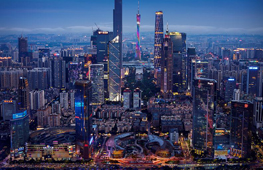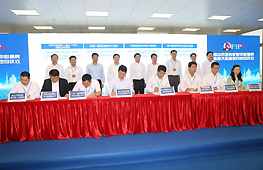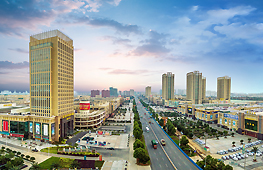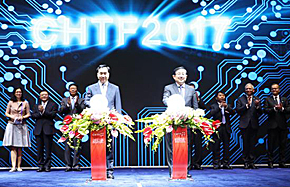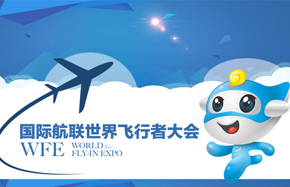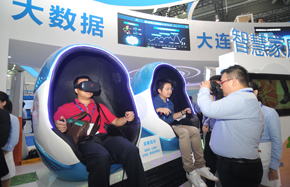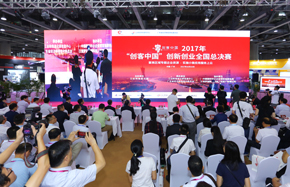Companies in SW China go global through the BRI
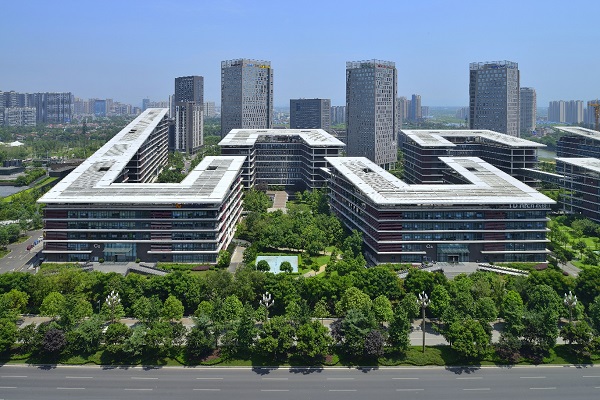 |
| Tianfu Software Park in Chengdu, Sichuan province. [Photo provided to China Daily] |
As the Belt and Road Initiative is recognized by more countries and regions in the world, companies at Tianfu Software Park in Chengdu, capital of Southwest China's Sichuan province, are becoming more closely connected to the world.
Chengdu Xgimi Technology, a smart projector designer and manufacturer based at Tianfu Software Park, is recently considering exporting its smart projectors to Europe through the China Railway Express (Chengdu).
The China Railway Express (Chengdu) launched in 2013 in line with the Belt and Road Initiative and has become the most frequently used cargo express service between China and Europe. It can deliver goods from Chengdu to Europe in about 10 days.
Xgimi had the largest shipments of smart projectors in China in 2018, according to a report by market consultancy IDC. Its products are also sold in 100 countries and regions around the world, and saw rapid growth in the European market.
"Currently, almost all of our products are exported by air. With the rapid increase of exports to Europe, we are planning to adopt the China Railway Express (Chengdu) to reduce the logistics cost," said an executive at the company.
The express train costs only a quarter of the price of air cargo transportation.
"The Belt and Road Initiative provides us with a good opportunity to explore the overseas market," the executive said, adding that Xgimi will continue its expansion in the European, American, and Japanese markets, while at the same time explore the Southeast Asian market.
Dell, one of the world's leading computer makers, who has a presence at Tianfu Software Park, has also benefited from the China Railway Express (Chengdu).
In the year that the freight train started its services, Dell established a global operation center in Chengdu and later built a manufacturing plant in the city, which makes products that are sold in China, Europe, and the United States.
Zhang Yaohua, a senior executive at Dell, said the train was one of the most important reasons that the company chose Chengdu as the location of its global operation center.
He explained that Dell takes pride in its zero-inventory model, which means it does not assemble computers before any orders are received, and this requires a good supply chain.
Zhang said the Chengdu-Europe freight train has slashed the time needed for its products to be shipped to European markets. Thanks to the train, the Chengdu plant has now become one of Dell's most efficient manufacturing facilities in the world.
Apart from Dell, Tianfu Software Park has become a preferred place for a number of well-known multinationals, including Ubisoft, Bosch, Ericsson, Nokia, and Maersk, to execute their strategic layout in China.
With the all-inclusive opening up of Chengdu, the mobile Internet enterprises at Tianfu Software Park, which is also a national technology enterprise incubator and a national makerspace, are also developing their business in the countries and regions involved in the Belt and Road Initiative.
Tap4fun, a leading mobile online game developer, generates most of its revenue overseas. It also invests in and helps other online game developers in Beijing, Shanghai, and Chengdu to explore the overseas market.
Camera360, a photography application developed by Chengdu Pinguo Technology Co., Ltd., has 600 million overseas users. The users are mainly in Southeast Asia, the United States, Japan, and South Korea.
Four companies based at Tianfu Software Park, Tap4fun, Pinguo Technology, DHgames, and LionMobi, were recognized as among the 2018 Top 50 Chinese Cross Border Brands by Facebook and KPMG.
In accordance with the strategic development plan of Tianfu Software Park, more opportunities for international cooperation and communication will be continuously provided through enhanced services to companies at the park.







